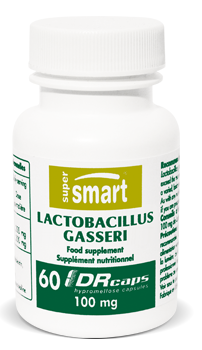Scientific and medical journals are filled with articles on the activity and benefits of probiotics – their value to human health continues to generate optimism …

Probiotics are living micro-organisms which, when consumed in sufficient quantities, produce systemic and digestive benefits. Among the many probiotic strains, the lactobacillus genus of bacteria is particularly well represented. Colonizing the intestines and vagina, lactobacillus genus of probiotics for women has various effects and in particular, can:
-
- • relieve irritable bowel syndrome
- • restore the balance of microflora
- • reduce various types of diarrhea
- • optimize the body’s natural immune function
- • protect against the flu virus
- • prevent colonization of the gastric mucosa by
Helicobacter pylori
Lactobacillus gasseri, a strain naturally present in human breast milk, is thus part of the group of micro-organisms that are essential for overall equilibrium. A recent discovery, however, has identified its potential in a completely different area – that of weight control.

~Indeed Lactobacillus gasseri represents a major new addition in a field where there is considerable cross-over between genetic and metabolic causes, low metabolic energy, cardiovascular disease and type 2 diabetes.
~A number of studies report that consumption of Lactobacillus gasseri promotes a reduction in abdominal adipose fat. A 12-week, double-blind Japanese study of 210 adults with abdominal adiposity clearly showed that Lactobacillus gasseri reduced BMI (Body Mass Index), waist and hip circumference, and abdominal fat mass by 8.5% in comparison with a control group where no such parameter changes were noted. However, the researchers also found that regular ingestion is necessary for such effects to endure.
~Research published in the journal Nature in 2006 had already indicated that microbial populations in the gut are different between lean and obese people and that when obese people lose weight, the composition of their microflora reverts back to that of individuals with a normal BMI, thus suggesting obesity may have a microbial component.
~Another study conducted on mice also demonstrated that consumption of L. gasseri not only reduced weight and body fat but also lowered blood glucose levels in animals with type 2 diabetes.
~The mice were divided into three groups – the first receiving a normal diet, the second a high-sucrose diet and the third the same high-sucrose diet but supplemented with Lactobacillus gasseri, for a period of 10 weeks.
~At the end of the study, it was shown that L. gasseri considerably reduced bodyweight and adipose tissue in the supplemented mice, and also had substantial ‘anti-diabetes type 2’ activity.
~Sub-cutaneous adipocytes are the major source of leptin and adiponectin. Leptin is an adipocyte hormone which controls weight by regulating food intake and energy output. Leptin concentration is closely linked with body fat percentage and higher serum levels are always found in obese individuals. According to this study, administration of L. gasseri suppressed increases in plasma leptin, suggesting that a reduction in weight and fat mass is associated with a decrease in serum leptin. Similar effects had already been observed in earlier studies.
Finally, GLUT4 is one of the main transporters of glucose in skeletal muscle and adipose tissue. Increased expression of the GLUT4 gene in adipose tissue is known to improve the insulin resistance associated with type 2 diabetes. In this study, L. gasseri significantly increased expression of the GLUT4 gene in adipose tissue. In addition, insulin levels fell significantly. Given that in pre-diabetic states, increases in blood glucose stimulate the secretion of insulin, and that hyperinsulinaemia is frequently accompanied by obesity, consumption of L. gasseri would appear to help reduce insulin resistance and thus improve pre-diabetic states.
In summary, the probiotic L. gasseri helps reduce bodyweight and adiposity by lowering levels of leptin and insulin, suggesting that it may facilitate treatment of metabolic syndrome.
The fact that Lactobacillus gasseri is easy to take, totally safe, with benefits both for the digestive system and for weight control, makes it a ‘must-take’ daily supplement.
Alongside the strain Lactobacillus gasseri, other probiotic bacteria may be of interest for their protective effects. They include the patented strain Bacillus subtilis, recognised for its immune-stimulant properties, and Lactobacillus reuteri, indicated for intestinal problems such as diarrhea.
As probiotics are particularly vulnerable to stomach acids, Lactobacillus gasseri comes in DR Caps™ – gastro-resistant capsules – to ensure optimal delivery of six billion micro-organisms a day.

Leave a Reply